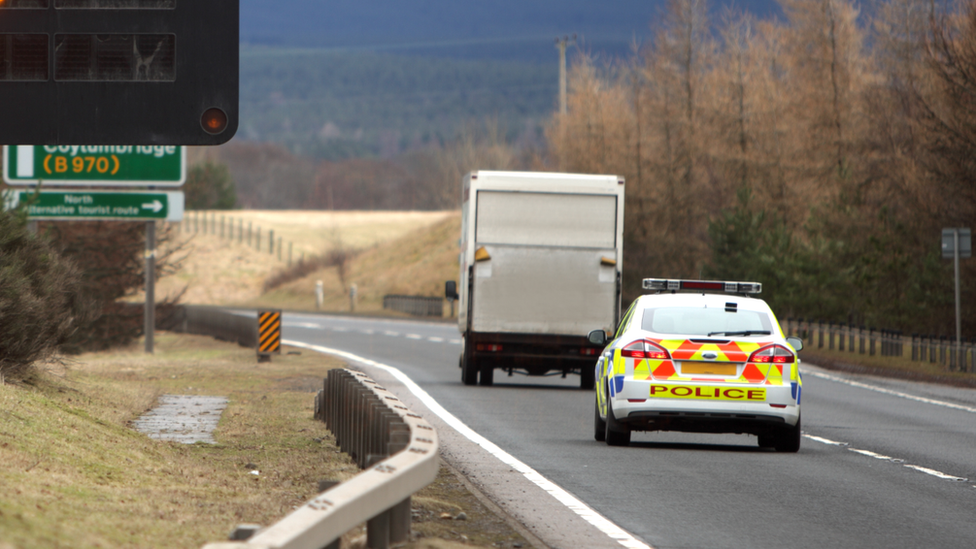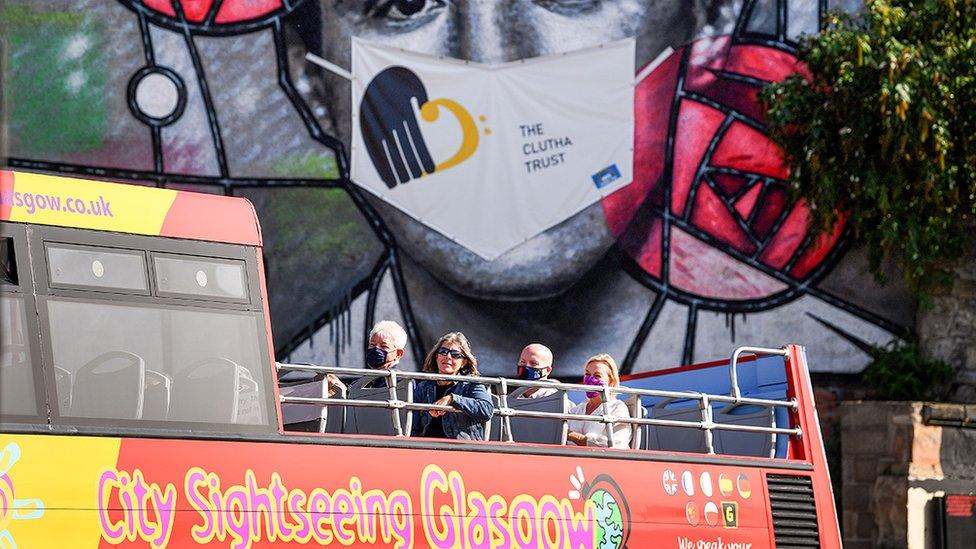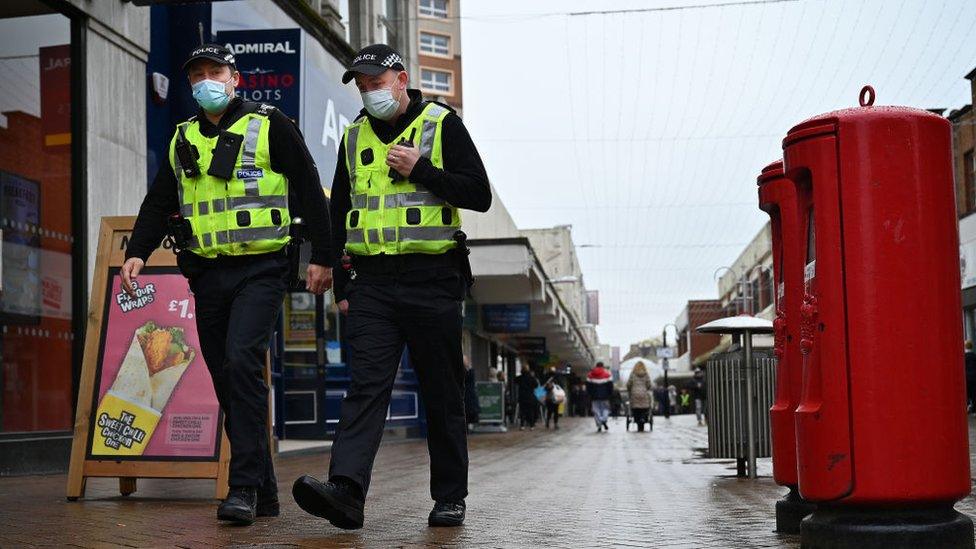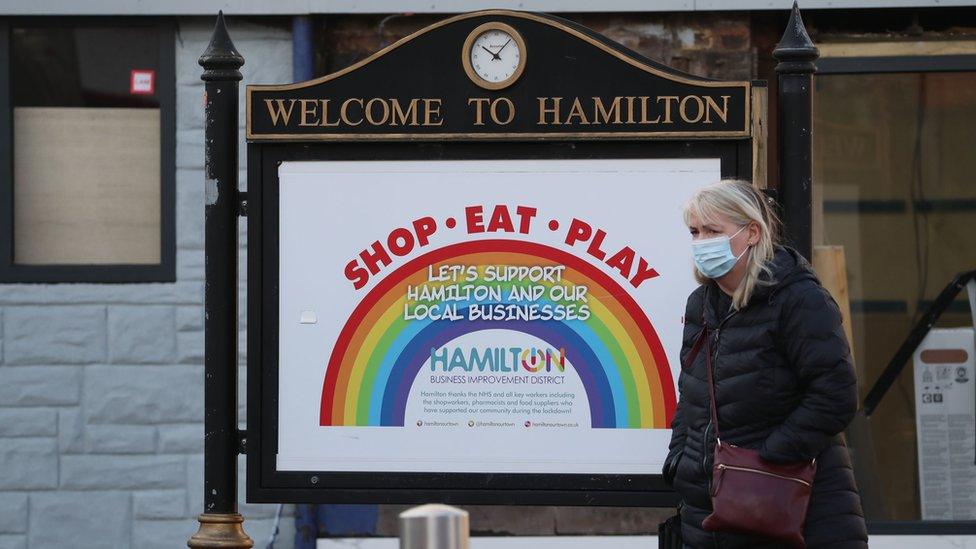Covid in Scotland: Threat to make travel ban law criticised
- Published
- comments

Campaigners and opposition politicians have criticised the first minister for saying she may make travelling to and from Covid hotspots against the law.
It follows comments from Nicola Sturgeon that the Scottish government was "actively considering" the change.
Currently people living in Level 3 restriction zones are only "advised" to remain within their local authority area.
If the guidance is made law, those caught breaking it could face a fine.
Police Scotland said it was working to support current restrictions and limit the spread of the virus.
The change, which would affect most people living in the central belt, could be made as early as next week - when coronavirus restrictions are reviewed on Tuesday.
On Wednesday, Nicola Sturgeon confirmed that the Scottish government was considering whether to give the guidance a "legal underpinning".
Ms Sturgeon said the current fixed penalty framework - starting at £60 - would be the likely "starting point" for any enforcement.
'Inappropriate overreach'
She denied that the move would be "an inappropriate overreach of the state", but said it was "about keeping people safe".
"I think we all recognise that when something is put in law, most people realise - more than they do when its guidance - that it's important."
Figures from Transport Scotland, external for last week showed car journeys were down by 20% on the same period last year.
However, journeys on public transport dipped further. Rail journeys dropped by 80% compared with 2019, with concessionary bus trips down by 55%.
Nicola Sturgeon said a system of travel fines could be introduced if restrictions on movement are put into law
Assistant Chief Constable Alan Speirs said it would not be appropriate to speculate on what future restrictions might look like or which areas may be affected.
He said: "Police Scotland is working with a range of partners across the country to support the restrictions in place to tackle the coronavirus pandemic.
"We fully understand the implications these have on our daily lives, but we cannot have people twisting the rules and disregarding the law which is there to stop the spread of coronavirus and help save lives."
Matt Kilcoyne, of the Adam Smith Institute think tank, said there was a risk that such a law would be "rash" and "rushed".
He said it would be a "heavy-handed decision", and called for the Scottish government to recognise the strength of opposition.
"These are decisions that are too big to be taken behind closed doors quickly," he added.
"People are not taking the mick - they are still complying."
He added that the current more liberal approach provided people with the flexibility they needed to live their lives.
'Considered by parliament'
Opposition politicians have also questioned the idea.
Donald Cameron, the Scottish Conservatives' health spokesman, said it was crucial that restrictions were communicated well so the public were "in absolutely no doubt" about the travel restrictions.
"We cannot have another shambles like the SNP's mixed messages over what's a cafe and what's a restaurant.
"If further restrictions are necessary to suppress the virus, they should be considered by parliament,"
Scottish Labour's health spokeswoman Monica Lennon asked why this was necessary now and had not been used during the first lockdown in the spring.
She said the evidence supporting the need for a travel ban should be made public as well as details about how it could be realistically enforced.
"It is not a decision for the Scottish government to take alone - parliament must be consulted and give its consent on a matter of such importance," she added.
Enable people to do the right thing'
And Scottish Liberal Democrat leader Willie Rennie said encouragement would be a better approach compared with "hastily opting to use the law".
Mr Rennie added: "We don't want a situation where the government is coming down hard on people who have gone to a park just over the border of the next council area.
"If ministers had boosted testing capacity and built a contact tracing system that was up to scratch, we might not be in this situation."
Prof Susan Michie, a behavioural scientist at University College London, said the best strategy was to "support and enable people to do the right thing", with fines being a last resort.
She told BBC Scotland's Good Morning Scotland that people were more likely to accept a situation if they perceived it to be fair.
Explaining why the rules were being changed and what the impact would be on suppressing transmission of the virus were important too, she said.


- Published4 November 2020

- Published19 November 2020

- Published10 November 2020
